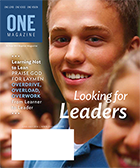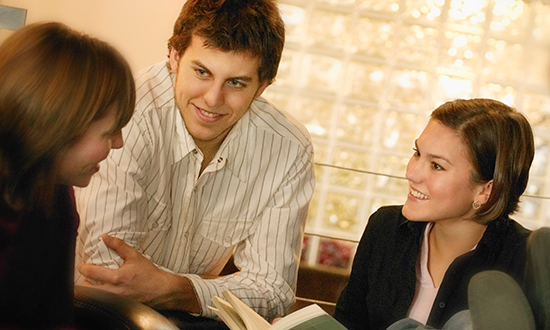
June-July 2014
Looking for Leaders
------------------
|

Tips for Teaching Adult Learners
Teaching for Transformation
by Ronda Sturgill
Have you ever stopped to think about the number of Christian resources available today? Too many to count, wouldn’t you say? With so much information,
the question begs to be asked, “Why do we see so little transformation?”
Simply imparting information will not lead to a transformation. Transformational learning is characterized by inviting learners to examine critically, interact with, and immediately apply material to their individual lives.
In this context, transformation is changing old ways of thinking, knowing, and doing into new ways of thinking, knowing, and doing. True transformation is demonstrated by a change in thoughts, attitudes, and actions in the hearts and minds of learners. This is the ultimate goal of transformational teaching and learning, and should be the goal of every person who teaches Christian education.
Teaching adults requires a radically different approach than teaching children. In today’s postmodern world, transformational teaching demands that the church offer the same gospel message of grace, salvation, redemption, and hope in new, fresh, and creative ways. Christian education can no longer take an authoritarian role where knowledge is imposed upon passive learners, prescribing what they are to learn, how they are to think, and how they are to behave.
Every learner must be valued and respected as a child of God, capable of growth and change through the work of the Holy Spirit. Christian educators must offer opportunities for the Holy Spirit to do His work in the lives of their learners. This can happen anywhere at anytime, but it happens most often when teachers accommodate the learning characteristics of adult learners.
Characteristics of Adult Learners
Every adult enters the classroom with a vast amount of prior knowledge and experience. For deep learning to occur, it’s important for learners to have the opportunity to make connections between what they already know and the material being presented. Their prior knowledge and past experience becomes the starting point for new learning. Without the opportunity to make this connection, adults struggle to make sense of the new information.
Adults like to participate in the learning process. They learn by doing and are quite capable of reaching their own conclusions when presented with the opportunity to brainstorm, solve problems, and think critically.
Adults also enjoy learning from their peers. Since everyone comes from different backgrounds and has different experiences and perspectives, learners often minister to one another in ways the teacher cannot. Adults learn best when they perceive the relevance of the subject as it pertains to their individual lives. Learning must be meaningful to be transformational. Most adults are especially motivated to learn when they encounter disharmony between their experience and their perception of God.
Just as adult learners have their own characteristics, so do effective adult educators. The role of “teacher as a teller” is diminished, while the role of the teacher as a guide, coach, or facilitator increases. Humility is one the most important characteristics for an effective adult educator. “None but the humble become good teachers of adults.” [1] The focus is on the learners and what they are learning, not on what the teacher knows. This is learner-centered teaching.
In contrast, the teacher does all the talking in a teacher-centered approach. When the teacher is talking, the learners are not learning! Instead of being the sage on the stage, an adult educator must take on an entirely different role. He or she becomes a guide on the side who leads and directs learners through well-thought-out learning activities that call for active participation. The goal of the teacher is to create opportunities for critical thinking, not to transmit information. For some teachers, this is a difficult adjustment. However, with a little instruction and training, most teachers can learn how to offer more interactive and engaging lessons.
A good place to start is to intentionally plan learning activities that require learners to do something. Here are just a few statements that lead to such activities:
-
Trace the development of…
-
In your own words, summarize…
-
Compare and contrast…
-
Differentiate between…
-
Compose a poem.
-
Make a collage.
-
Solve this real-life situation.
-
Examine what you already know about…
These are not questions. The teacher is challenging learners to do something. Suddenly, learners become producers of information, not simply consumers of information. For transformational learning to occur, learners must be able to take the information they learn and produce it again in relevant situations. Teachers who provide opportunities to do this are effective teachers.
The activities my learners most enjoy are those that allow them to be creative. They love to make collages that represent what they’ve learned. They like to write poems, short stories, role-play, or solve a problem using biblical principles from the lesson. Through interactive learning activities, more happens than just the transfer of information. Classroom relationships are built and strengthened as adults learn from their teacher and their peers. Interactive activities often foster mentoring relationships.
I confess. I used to be the sage on the stage, but I found becoming a guide on the side is a more effective (and fun) way to teach. It was a hard step at first, but once I saw the interest of my learners come to life, and discovered that I could learn as much from them as they did from me, I was hooked! Teaching for transformation transformed me as much as it has my students.
[1] Lindeman, E.C. (1945). "The Sociology of Adult Education." Journal of Educational Sociology, 19 (1), 4-13
About the Writer: Ronda Sturgill is an author and much-sought-after motivational speaker. She is the wife of Free Will Baptist chaplain
(LT COL) Tim Sturgill.
|
|

